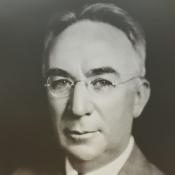Joseph Edmund Sterrett
 The son of Ezekiel and Martha Jane McCurdy Sterrett was born on June 17, 1870, in Brockway, Pennsylvania. In 1887 he was employed with a coal company in Beechtree, Pennsylvania. In 1891 he became an associate of John W. Francis, public accountant, in Philadelphia. They formed the partnership, Francis & Sterrett, in 1893; the firm continued until 1901 when Mr. Francis died. Mr. Sterrett continued to operate the firm under his name until 1907, at which time the firm was consolidated with Price Waterhouse & Co. He was a senior partner of the latter firm at the time of his death. He was certified as a CPA in 1899 (Pennsylvania).
The son of Ezekiel and Martha Jane McCurdy Sterrett was born on June 17, 1870, in Brockway, Pennsylvania. In 1887 he was employed with a coal company in Beechtree, Pennsylvania. In 1891 he became an associate of John W. Francis, public accountant, in Philadelphia. They formed the partnership, Francis & Sterrett, in 1893; the firm continued until 1901 when Mr. Francis died. Mr. Sterrett continued to operate the firm under his name until 1907, at which time the firm was consolidated with Price Waterhouse & Co. He was a senior partner of the latter firm at the time of his death. He was certified as a CPA in 1899 (Pennsylvania).
Active in professional organizations, he served as president (1908-10) and as treasurer (1919-22) of the AICPA. He was also a member of its Council (1916-18; 1927-32) and ten terms a member of its Executive Committee. He also served on many AICPA committees, including as a member of the Special Committee on Accounting Procedure (1930-31) and chairman of the Committee on Publications (1916-24); his efforts in this capacity enhanced the excellence of The Journal of Accountancy. He was instrumental in obtaining passage of Pennsylvania Law (1897), regulating the profession of accounting in that state, and for many years he was a member of the Board of Examiners of the state's Board of CPAs. He was a major supporter in establishing the Pennsylvania Institute of CPAs in 1897, serving as secretary (1897-1901), member of the Executive Committee, and president (1904-06). He served as chairman of the First International Congress of Accountants held in St. Louis (1904).
He devoted a great deal of time to public service. He served the federal government as a member of the Advisory Committee to the Commission on Economy and Efficiency (1911-12), the Board of Tax Advisors (1917-19), and the Advisory Tax Board (1918-19). He was also tax advisor to the Secretary of the Treasury (1921-22). He was the American member of the Transfer Committee under the Dawes Plan of Reparation Payments, which supervised the transfer of German reparation payments to the creditor nations (1924-27); for his distinguished service he was decorated by the governments of Belgium, France, Germany, and Italy. He also served as chairman of the Executive Committee (1932-33) and the Committee on Taxation (1928-30) of the New York State Chamber of Commerce. He was a trustee of the Dry Dock Savings lnstitution (1922-24; 1928-34) and director of the National Bureau of Economic Research (1919-25). He wrote numerous articles for professional journals and he authored The Modern Trust Company with F. B. Kirkbride (1905). He presented lectures at Harvard, New York, Pennsylvania, and Yale Universities.
He married Margaret McCurdy on June 17, 1897; they had two children. He died March 22, 1934 at the age of 63.
 The son of Ezekiel and Martha Jane McCurdy Sterrett was born on June 17, 1870, in Brockway, Pennsylvania. In 1887 he was employed with a coal company in Beechtree, Pennsylvania. In 1891 he became an associate of John W. Francis, public accountant, in Philadelphia. They formed the partnership, Francis & Sterrett, in 1893; the firm continued until 1901 when Mr. Francis died. Mr. Sterrett continued to operate the firm under his name until 1907, at which time the firm was consolidated with Price Waterhouse & Co. He was a senior partner of the latter firm at the time of his death. He was certified as a CPA in 1899 (Pennsylvania).
The son of Ezekiel and Martha Jane McCurdy Sterrett was born on June 17, 1870, in Brockway, Pennsylvania. In 1887 he was employed with a coal company in Beechtree, Pennsylvania. In 1891 he became an associate of John W. Francis, public accountant, in Philadelphia. They formed the partnership, Francis & Sterrett, in 1893; the firm continued until 1901 when Mr. Francis died. Mr. Sterrett continued to operate the firm under his name until 1907, at which time the firm was consolidated with Price Waterhouse & Co. He was a senior partner of the latter firm at the time of his death. He was certified as a CPA in 1899 (Pennsylvania).